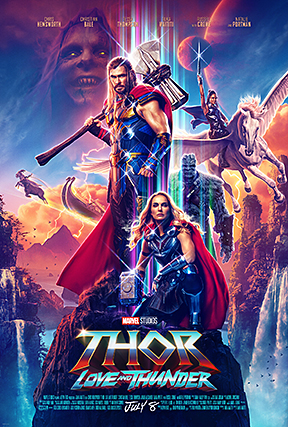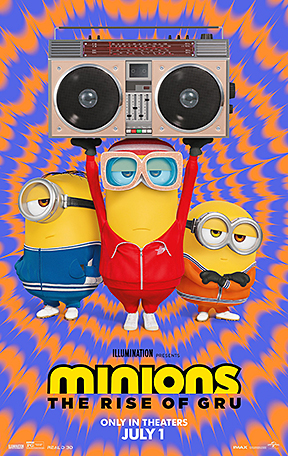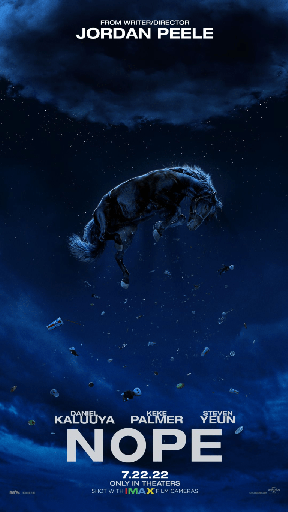Summer Hits
The summer blockbuster season has continued to deliver big names from established franchises and powerful directors. The month of July was no different.
 The mighty Thor (Chris Hemsworth) has returned to the big screen in THOR: LOVE AND THUNDER. Though happy to save worlds when needed, his broken heart still pines for his beloved Jane (Natalie Portman). After teaming up with the Guardians of the Galaxy for a while, he decides to head out on his own once he discovers that a number of gods have been killed throughout the universe. This will eventually lead him to a battle with Gorr (a delightfully creepy Christian Bale), an evil entity whose own tragic story has lead him to wish death and destruction upon all immortals.
The mighty Thor (Chris Hemsworth) has returned to the big screen in THOR: LOVE AND THUNDER. Though happy to save worlds when needed, his broken heart still pines for his beloved Jane (Natalie Portman). After teaming up with the Guardians of the Galaxy for a while, he decides to head out on his own once he discovers that a number of gods have been killed throughout the universe. This will eventually lead him to a battle with Gorr (a delightfully creepy Christian Bale), an evil entity whose own tragic story has lead him to wish death and destruction upon all immortals.
Natalie Portman makes her return to the MCU as Jane, and for the first time, dons the Thor gear herself. She has been afflicted with cancer, and while her body breaks down in the real world, when she is holding Thor’s beloved Mjolnir she possesses all of the might and powers of the gods. The duo rekindle what was once lost, and team up together in an attempt to defeat the pasty Gorr.
Writer/director/star Taika Waititi injects his own unique brand of moviemaking in LOVE AND THUNDER. Some have levied criticisms that the film is played as a straight comedy, which somehow is meant to be a knock on the production. I went the other way on this. After the droll DR. STRANGE AND THE MULTIVERSE OF MADNESS, I found the humor and stylish filmmaking the exact thing that was missing the last time around. It appears that Hemsworth is still having fun playing Thor, and this permeates throughout the production. Waititi, whose character Korg serves as a sort of quasi-narrator, took a page from the James Gunn playbook, blending music (mostly in the form of Guns N’ Roses), laughs, and bombastic action sequences in equal measure. The result is a flashy, fun, and rollicking good time that may not be the best the MCU has to offer, but definitely a step back in the right direction.
THOR: LOVE AND THUNDER: B
 Opening a week prior to THOR, MINIONS: THE RISE OF GRU brought the pint-sized yellow blobs back to the big screen after nearly a two-year delay. If you are a fan of Steve Carrell and/or gibberish, boy, have I got the movie for you.
Opening a week prior to THOR, MINIONS: THE RISE OF GRU brought the pint-sized yellow blobs back to the big screen after nearly a two-year delay. If you are a fan of Steve Carrell and/or gibberish, boy, have I got the movie for you.
When pint-sized Gru (Carrell) scores a job interview with his favorite group of
super-villains, he couldn’t be more elated. This is the moment he has always waited
for. He excitedly tells his adopted minions (who are busy building his lair) that his
time has come, and the world will soon know his name. Once he shows up, however, he is laughed at and insulted, with Belle Bottom (Taraji P. Henson) boldly and rudely informing him that no “kid” will ever join their ranks. Initially heartbroken, Gru seizes an opportunity to outsmart the group in hopes of impressing them and steals an artifact from right under their noses. This makes them more enraged than impressed, and he instantly becomes a target of their wrath.
MINIONS: THE RISE OF GRU is, at the end of the day, a MINIONS movie. It doesn’t break any new ground, it doesn’t deliver powerful insight into the psyche of the supervillain or his posse, and it’s fairly ridiculous to think that it ever would. The plotline described above is more of an attempt to fuse together scenes that will allow the Minions to fly a plane and smack each other around while also displaying an unwavering loyalty to their beloved “mini-boss.” It’s also an excuse to let Carrell and his oddly endearing accent cut loose, delivering plenty of laughs amidst the physical comedy of his crew. This certainly isn’t Pixar, and chances are, you already know if you and your kids are going to like it or not.
MINIONS: THE RISE OF GRU: B-
 Emerging as the only stand-alone saga in this summer collection is the UFO story NOPE. The third film by writer/director/producer Jordan Peele is as polarizing as his previous ventures GET OUT and US, though perhaps a bit more straight forward in its narrative and messages than the other two…or, is it?
Emerging as the only stand-alone saga in this summer collection is the UFO story NOPE. The third film by writer/director/producer Jordan Peele is as polarizing as his previous ventures GET OUT and US, though perhaps a bit more straight forward in its narrative and messages than the other two…or, is it?
Given the love it or hate it nature of Poole’s previous films, I should let you know right from the jump that I easily found myself in the “love it” camp for both productions. With NOPE, I’m on the same side of the fence. Gripping in a way that no other film has been this season (and I’m not taking anything away from the high-octane thrills of MAVERICK here) it delivers visceral terror to anyone who has looked up in the sky and has questioned what they have seen.
After his father (Keith David) is killed in a freak accident, O.J. (Daniel Kaluuya) takes over Haywood’s Hollywood Horses, a farm that provides equine talent for movie and television productions. Quiet and solemn, he lacks that charisma of his sister Emerald (Keke Palmer) who does all of the talking during production meetings. The farm has fallen on hard times, and O.J. has been forced to sell many of their horses, though he longs to eventually buy them back.
When O.J. sees something in the sky and explains this encounter with his sister, the two device a plan to capitalize on the sighting. They instantly realize that something incredible is happening on their farm, and their father’s death may have a more sinister cause than originally expected. They purchase cameras from a local electronic store, and with the assistance of the overzealous technician Angel (Brandon Perea) create a setup that will get them “the Oprah shot.” This is the footage that will help make them millionaires.
There will be endless debates about NOPE and the meaning (or lack thereof) of certain scenes and plotlines. That’s what I absolutely love about Poole. He is only three films in, and already, he is a filmmaker that can be analyzed, dissected, and debated. NOPE is visually stunning and delivers multiple sequences of pulse-pounding terror and intensity. The performances by his cast are all magnificent (particularly Kaluuya and Palmer) and moments of fear are punctuated by unexpected laughs. It is the type of movie that crafted a spell that not only made me want to immediately watch it again, but made me surprised when I walked out into the lobby, only to discover that there was a world that existed outside of the theater.











